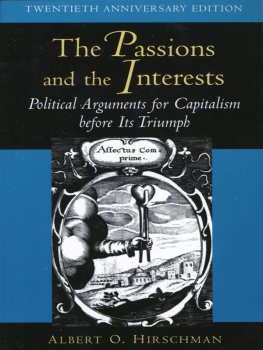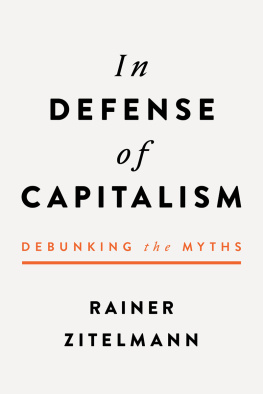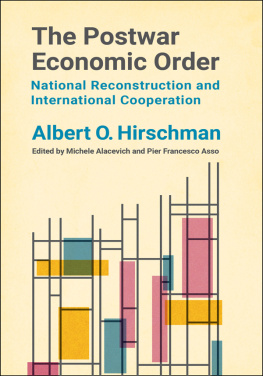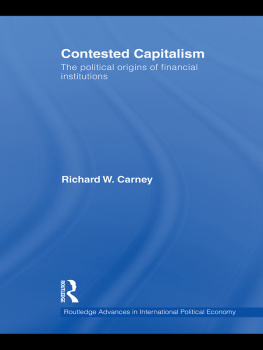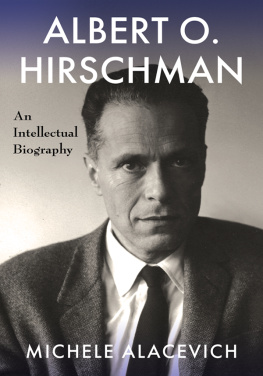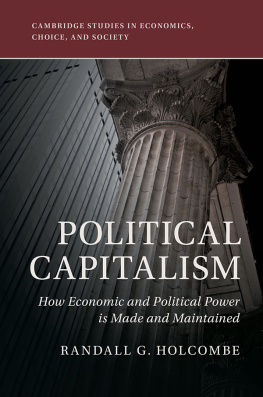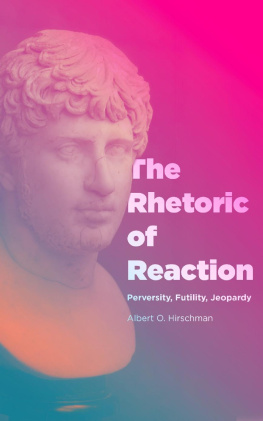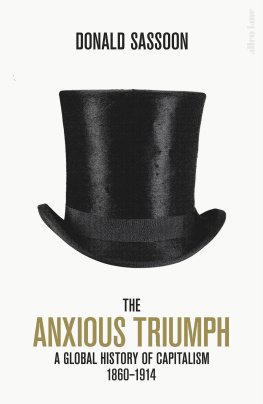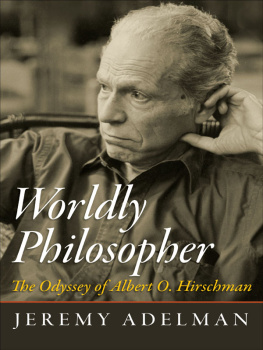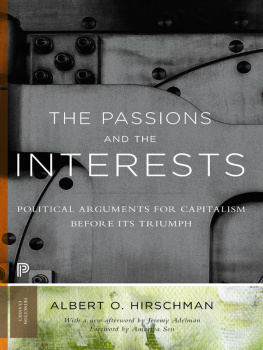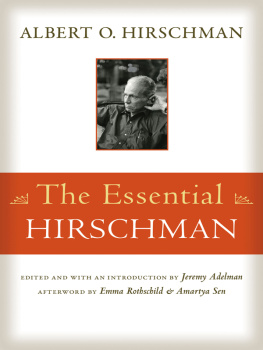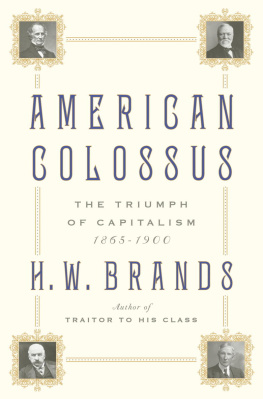Hirschman - The passions and the interests : political arguments for capitalism before its triumph
Here you can read online Hirschman - The passions and the interests : political arguments for capitalism before its triumph full text of the book (entire story) in english for free. Download pdf and epub, get meaning, cover and reviews about this ebook. City: Princeton, N.J, year: 1997, publisher: Princeton University Press, genre: Science. Description of the work, (preface) as well as reviews are available. Best literature library LitArk.com created for fans of good reading and offers a wide selection of genres:
Romance novel
Science fiction
Adventure
Detective
Science
History
Home and family
Prose
Art
Politics
Computer
Non-fiction
Religion
Business
Children
Humor
Choose a favorite category and find really read worthwhile books. Enjoy immersion in the world of imagination, feel the emotions of the characters or learn something new for yourself, make an fascinating discovery.
The passions and the interests : political arguments for capitalism before its triumph: summary, description and annotation
We offer to read an annotation, description, summary or preface (depends on what the author of the book "The passions and the interests : political arguments for capitalism before its triumph" wrote himself). If you haven't found the necessary information about the book — write in the comments, we will try to find it.
Hirschman: author's other books
Who wrote The passions and the interests : political arguments for capitalism before its triumph? Find out the surname, the name of the author of the book and a list of all author's works by series.
The passions and the interests : political arguments for capitalism before its triumph — read online for free the complete book (whole text) full work
Below is the text of the book, divided by pages. System saving the place of the last page read, allows you to conveniently read the book "The passions and the interests : political arguments for capitalism before its triumph" online for free, without having to search again every time where you left off. Put a bookmark, and you can go to the page where you finished reading at any time.
Font size:
Interval:
Bookmark:

THE PASSIONS AND THE INTERESTS

Emblem No. 27 Repress the Passions! in Peter Iselburg, Emblemata Politica, Nuremberg, 1617.
THE PASSIONS AND THE INTERESTS
Political Arguments for Capitalism before Its Triumph
TWENTIETH ANNIVERSARY EDITION
ALBERT O. HIRSCHMAN
PRINCETON UNIVERSITY PRESS
PRINCETON, NEW JERSEY
Copyright 1977 by Princeton University Press Foreword by Amartya Sen copyright 1997 by Princeton University Press Preface to the Twentieth Anniversary Edition copyright 1997 by Princeton University Press
Published by Princeton University Press, 41 William Street, Princeton, New Jersey 08540
In the United Kingdom: Princeton University Press, Chichester, West Sussex
All Rights Reserved
Library of Congress Cataloging-in-Publication Data
Hirschman, Albert O.
The passions and the interest: political arguments for capitalism before its triumph / Albert O. Hirschman. Twentieth anniversary ed.
p. cm.
Includes bibliographical references and index.
ISBN 1-400810-37X
1. CapitalismHistory. 2. Intellectual lifeHistory.
HB501.H523 1996
330.12'2dc21 96-29551
This book has been composed in Baskerville
Et il est heureux pour les hommes dtre dans une situation o, pendant que leurs passions leur inspirent la pense dtre mdiants, ils ont pourtant intrt de ne pas 1tre.
Montesquieu, De lesprit des lois
CONTENTS
, by Amartya Sen |
FOREWORD
A LBERT HIRSCHMAN is one of the great intellectuals of our time. His writings have transformed our understanding of economic development, social institutions, human behavior, and the nature and implications of our identities, loyalties, and commitments. To describe this book as one of Hirschmans finest contributions is therefore a very strong claim. It is more so because this is a bookindeed a slim monographon the history of economic thought, a subject that receives little attention and even less respect these days, and that has almost disappeared from the economics curriculum at most of the major universities around the world. The Passions and the Interests does not have the policy urgency that a contribution to public decisions may enjoy (as Hirschmans The Strategy of Economic Development eminently does), nor the compulsive immediacy that the exigencies of practical reason generate (as Exit, Voice, and Loyalty superbly portrayed). What then is so special about this book?
INNOCUOUS INTERESTS AND HARMFUL PASSIONS
The answer lies not only in the recognition that Hirschman makes us see the ideological foundations of capitalism in a fresh way, but also in the remarkable fact that this freshness is derived from ideas that are more than two-hundred-years old. The basic hypothesisthe articulation and development of which Hirschman investigatesmakes the case for capitalism rest on the belief that it would activate some benign human proclivities at the expense of some malignant ones. This way of seeing the issue cannot but appear very distant today, and it is, therefore, particularly remarkable that this thesis was so powerfully (and within its own logic, so cogently) developed and defended by the early champions of motivated capitalism. The success of capitalism in the contemporary world has been so total and so well recognized, and the identification of its virtues and vices are by now so standard, that it is hard to grasp that the system received its early intellectual defense from ideas that are very far removed from the way the issues are seen today.
The basic idea is one of compelling simplicity. To use an analogy (in a classic Hollywood form), consider a situation in which you are being chased by murderous bigots who passionately dislike something about youthe color of your skin, the look of your nose, the nature of your faith, or whatever. As they zero in on you, you throw some money around as you flee, and each of them gets down to the serious business of individually collecting the notes. As you escape, you may be impressed by your own good luck that the thugs have such benign self-interest, but the universalizing theorist would also note that this is only an examplea crude exampleof the general phenomenon of violent passion being subdued by innocuous interest in acquiring wealth. The applause is for capitalism as seen by its pioneering defenders, studied in this penetrating monograph.
CONTRAST WITH INFORMATIONAL ECONOMY AND INCENTIVES
The behavioral foundations of capitalism do, of course, continue to engage attention, and the pursuit of self-interest still occupies a central position in theories about the workings and successes of capitalism. But in these recent theories, interests are given a rather differentand much more positiverole in promoting efficient allocation of resources through informational economy as well as the smooth working of incentives, rather than the negative role of blocking harmful passions.
Montesquieus argument, in a passage that inspired Hirschman to undertake this historical inquiry (as he records in his new Preface), related to his belie? that even though passions may prompt people to be wicked, they have nevertheless an interest in not being so. James Steuart eulogized interests as the most effectual bridle against the folly of despotism. This points in a different direction from the motivational analysis in contemporary theories of the market economy and unrestrained capitalism.
CONTEMPORARY CONNECTIONS
The interest in this work does not, however, lie only in the historical illumination it provides. There are many connections with the concerns of today. Given the terrible impact of nasty passions in the contemporary world, it is certainly important to ask whether capitalism and the acquisitive instinct can be harnessed to disengage people from their damaging behavior. Not only did Montesquieu, Steuart, and some of their contemporaries see self-interest as a great savior; several later writers (often unaware of the previous literature) also considered self-interest a great way of escaping the impact of evil passions.
As Hirschman points out, even Keynes noted that it was better that a man should tyrannize over his bank balance than over his fellow-citizens, expressing the hope that the former might serve as an alternative to the latter. Hirschman may be just a little bit unfair to Keynes when he notes that after the story that has been told, it is almost painful to see Keynes resort, in his characteristically low-key defense of capitalism, to the identical argument that was used by Dr. Johnson and other eighteenth-century figures. The argument surely remains of interest, despite its lack of novelty (as we now know from Hirschman), and Keyness possible ignorance of the earlier literature does not undermine the relevance of his inquiry.
If the proposed connection were to work, it would certainly provide a substantive justification for capitalism that is altogether different from what comes via General Equilibrium Theory and related structures, with their emphasis on given preferences and the insulation of economic concerns from other motivations. Hirschman has, in fact, beautifully pursued this line of reasoning further in his Rival Views of Market Society. It is of course difficult to see that the promotion of profit making and marketization can be a general method of suppressing fundamentalist abuse and harmful passions (for example, it is unlikely that any immediate solution to the problems in Bosnia or Rwanda or Burundi can be found through encouraging economic self-interest), but there is a possible connection here that cannot be altogether dismissed, especially in the long run.
Next pageFont size:
Interval:
Bookmark:
Similar books «The passions and the interests : political arguments for capitalism before its triumph»
Look at similar books to The passions and the interests : political arguments for capitalism before its triumph. We have selected literature similar in name and meaning in the hope of providing readers with more options to find new, interesting, not yet read works.
Discussion, reviews of the book The passions and the interests : political arguments for capitalism before its triumph and just readers' own opinions. Leave your comments, write what you think about the work, its meaning or the main characters. Specify what exactly you liked and what you didn't like, and why you think so.

